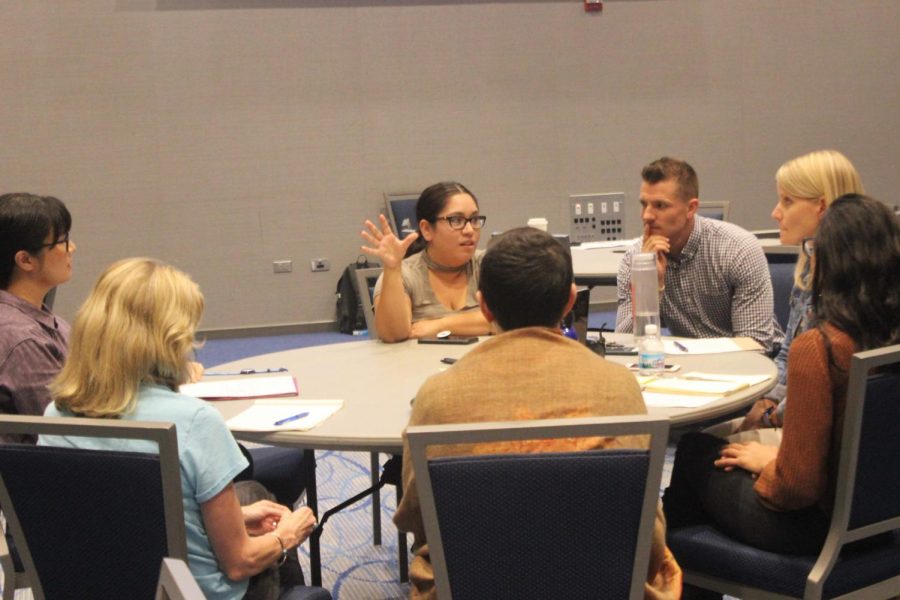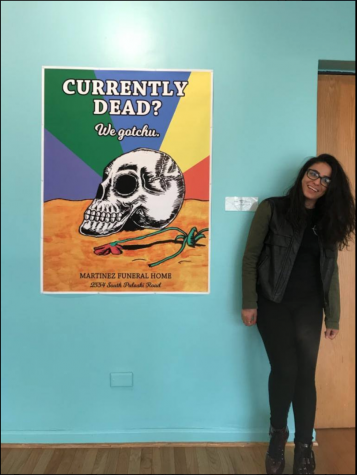Interactive ombuds workshop delves into conflict resolution
October 16, 2019
In celebration of International Conflict Resolution Month and Ombuds Day, recently hired university Ombuds, Tyler Smith, gave an interactive exploratory workshop on Oct. 10 in Alumni Hall North. As the workshop began, Smith encouraged its 18 participants, most of which had heard of the office and its function, to form groups. He explained that the event, without delving into participants’ personal lives, would involve dialogue and interaction.
“It’s a way of just talking more explicitly about conflict and how we experience conflict and how we make sense of conflict and the challenges and rewards that come with conflict,” Smith said.
Using questions to guide the conversation, Smith began by defining conflict and exploring the ideas of need-based and value-based conflict. He then asked the audience to consider the three different aspects of conflict- material, communicative and symbolic.
While the material component is essentially the physical things people conflict over, the communication portion governs the words they use and how they say them. Tone, volume and body language, also called paralanguage, all fall under this aspect of conflict.
“I often tell people communication is the very thing that gets us in conflict, but it’s also the thing that gets us out of it,” explained Smith.
The symbolic aspect of conflict may be a bit confusing to some. Smith explained it as the lens through which someone experiences the world and the conflicts they encounter.
“It’s what we bring to the conflict as the unique individual human beings that we are. Our experiences, our culture, our identity, our values and our beliefs,” said Smith.
Smith went on to explain that the convergence of these three avenues of conflict is what makes resolution challenging. One participant shared an example where one party is more engaged in remedial steps while the other remains disinterested.
Smith offered one possible explanation, underscoring the need for a holistic approach to resolution that includes more than one aspect of conflict. So while two individuals may find resolution with the physical component of a disagreement, oftentimes, if the communicative and symbolic aspects of the conflict are not considered, there may be a lack of follow-through.
Another participant considered the challenges that come with taking responsibility and making compromises, often required by both parties in conflict. Smith echoed this sentiment.
“I feel confident saying, in the amount of time that I’ve done ombuds work and seeing such a range of conflicts from different people in different ways or in different issues, 98% of the time there’s shared contribution to go around,” said Smith.
“I love this idea of ownership and responsibility in conflict. It’s huge and powerful,” Smith continued.
While ombuds work in conflict resolution on the individual level, the office also considers conflict on a systemic level. This is where an individual’s official role within an organization coupled with the specific culture of that organization come into play.
Smith highlighted how organizations in particular require resolution that gets to the core of the issue rather than finding temporary workarounds. He alluded to Amy Edmondson’s book “The Fearless Organization: Creating Psychological Safety in the Workplace for Learning, Innovation, and Growth.”
“She talks about this dynamic in organizations where people don’t feel comfortable in speaking up to raise issues. And instead they find workarounds, and those workarounds end up costing the organization a lot.”
Smith then shifted the conversation to consider how conflict can be rewarding and how one can use the energy from conflict to create positive change.
“Every conflict is rich with opportunity. It’s how we engage in it. That makes the difference between whether it’s constructive or destructive,” said Smith. “There is an opportunity for change, learning, growth, development, expanding our awareness and perspective. And it depends on how we choose to engage.”
Smith plans to hold skill-building workshops around conflict resolution in the near future. The Office of the Ombuds is located in Room 216 of the Ronald Williams Library. The Ombuds is available for appointments with members of the university community in his office, at the Carruthers and El Centro campuses, off-campus or by phone. More detailed information can be found at www.neiu.edu/university-life/ombuds-office.










